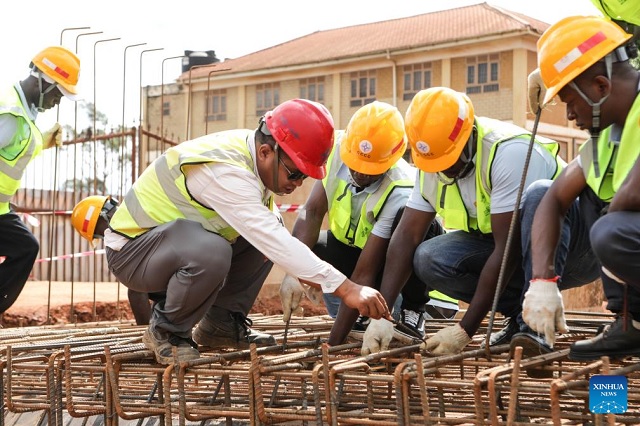
WAKISO, Uganda | Xinhua | The continuous participation of Chinese enterprises in Uganda’s economic development has equipped local employees with professional skills and knowledge, helping them to build their dreams.
Musitwa Abel is among the 32 local employees of the China Communications Construction Company (CCCC) Uganda who have just completed a two-week training course offered by the company in partnership with Wuhan City Polytechnic (WCP) in central China’s Hubei Province.
The training, which is part of the company’s flagship local talent project dubbed “Seagull Project,” covers a series of theoretical and practical courses, including engineering drawing, construction machinery, and practical Chinese language.
Over the past decade, Abel has risen from a driver transporting construction materials to a lab technician. Now, he is even studying for a degree in software engineering at an open university, thanks to the CCCC, the Chinese construction company that has undertaken major infrastructure projects in the country.
“Since I joined the CCCC, my financial status has improved little by little,” Abel told Xinhua in a recent interview. “The knowledge and skills in various fields that the CCCC has given me are very useful.”
Faith Kironde, 24, is another beneficiary of the Seagull Project. Kironde joined the CCCC as a graduate trainee about seven months ago, and has since risen to the rank of assistant site engineer.
“They taught us a lot of things. In the beginning, when I was at the site, I was doing more theoretical things, paperwork, and inspections, but during the training, I really learned a lot of practical things. I learned how to fix steel (rebar tying), how to lay stone, how to do earthworks, and how to do it from scratch until the road is ready to be paved,” said Kironde.
Zhou Chuan, one of the Chinese language teachers, said she was impressed by the enthusiasm of the Ugandan technicians and industrial workers for the training. “They actively interacted with the teachers in the classroom, and all the trainees were engaged in learning Chinese and construction courses throughout the process.”
Zhou added that in addition to the language and construction courses and many material demonstrations related to the CCCC’s construction projects, the learners were also exposed to Chinese culture and the philosophy of the Chinese people to enhance a sense of belonging.
“Through this training, I wanted to share my theoretical knowledge and practical skills with our African brothers and sisters, so that they can perform better in their future work and realize their dreams with what they have learned and mastered,” said Lin Xianguang, another teacher for construction theoretical courses from WCP.
Zhao Wei, representative of the CCCC Uganda, said given the company’s operations in the country over the past two decades and its future, such training is crucial as the company considers how to develop locally and sustainably.
“After the first step of training, employees are integrated into our management system. Then, they are put through a cultivation process to help them grow with our system and eventually become qualified members and even outstanding core members,” said Zhao.
Since entering the Ugandan market, the Chinese company has successfully delivered dozens of projects, including the Kampala-Entebbe Expressway, which connects Entebbe International Airport, the country’s main gateway to the world, with Kampala, the country’s capital.
Thousands of local workers, including human resources specialists, environmental assessment engineers, safety engineers, site supervisors, and machine operators, have been involved in the construction of these projects, Zhao said. “This local talent is a valuable asset for the company.” ■
 The Independent Uganda: You get the Truth we Pay the Price
The Independent Uganda: You get the Truth we Pay the Price



